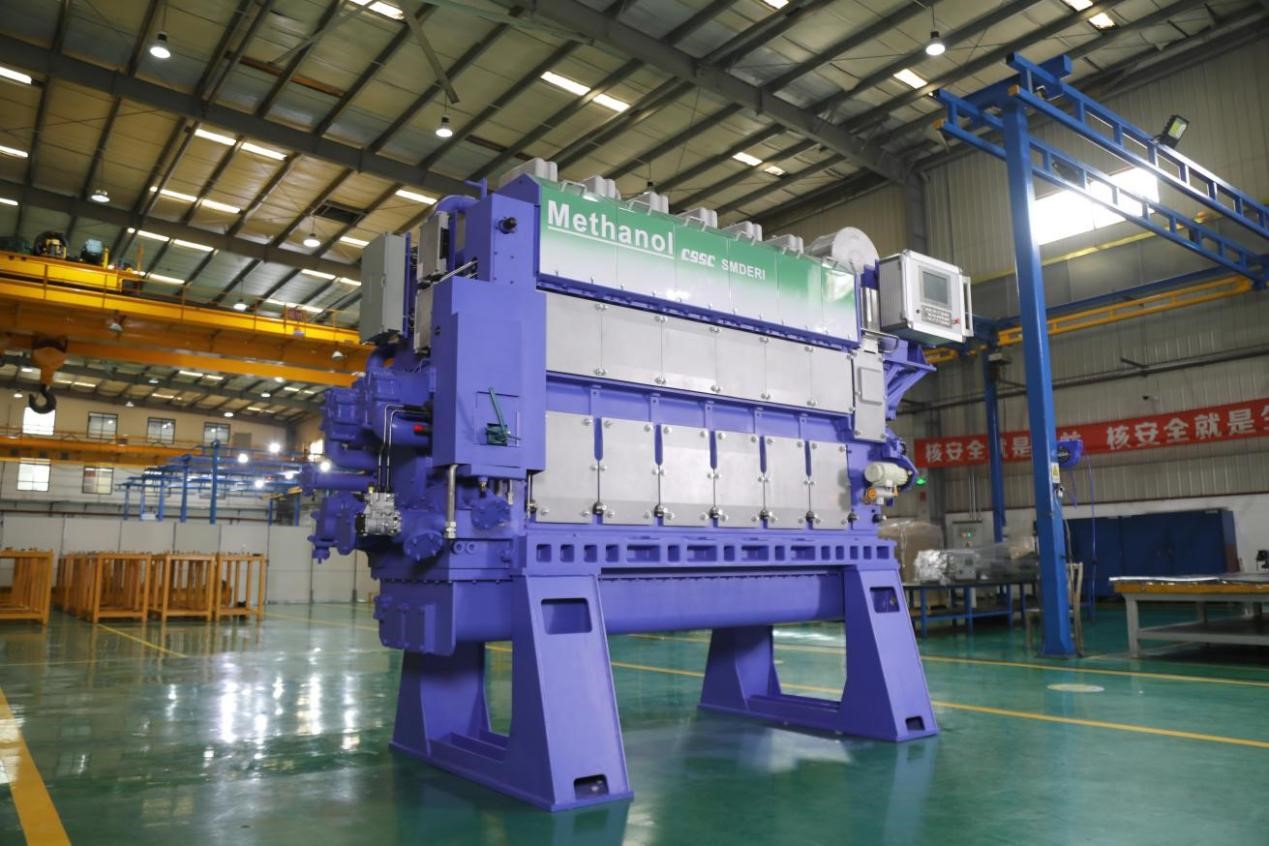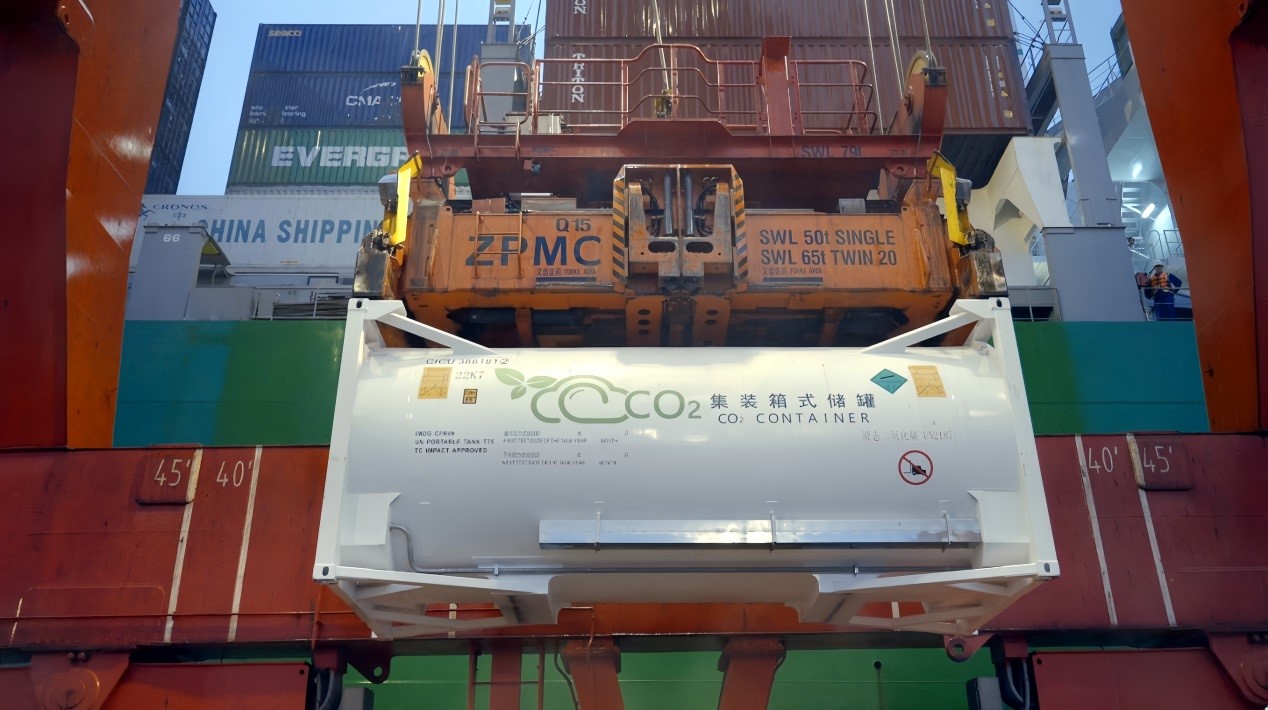711 Institute accelerates scientific and technological innovation around the two main lines of "energy upgrading" and "emission control"
On August 20, the 711th Research Institute of China Shipbuilding Corporation signed a contract for bulk methanol fuel engines with Wuhan Chuangxin Jianghai Transportation Co., Ltd. This is the first time that my country's marine methanol fuel engines have received bulk commercial orders, marking the transformation of this new domestically produced equipment from demonstration application to commercial application is another milestone moment for my country's own brand of low-carbon and zero-carbon engines.
In the diesel engine laboratory of the 711 Institute, the reporter saw the true appearance of this CS21DF-M methanol-fueled medium-speed engine. "It is green and efficient, convenient to use, safe and reliable, and can meet the needs of auxiliary power generation machines for ocean-going ships and main propulsion engines for inland and coastal ships. This is also a product we have independently developed to adapt to the green and low-carbon development of the shipping industry." Qiu Aihua, deputy director of the 711 Institute, said.
A major breakthrough was achieved in ammonia/diesel dual fuel complete machine
Comprehensively promote the formation of new productivity in the ship power industry
80% of global trade is completed through sea transportation, but the carbon emissions of the shipping industry have remained high for a long time, and the environmental pollution caused by ship shipping has attracted great attention from the international community. According to statistics from the International Maritime Organization (IMO), in 2020, the global shipping industry's carbon emissions accounted for approximately 3% of global anthropogenic carbon emissions; if effective measures are not taken, this proportion will increase to 18% by 2050. In order to cope with global warming, IMO has clearly proposed a strategy to reduce greenhouse gas emissions from ships and achieve net-zero emissions in the shipping industry by 2050. Green and low-carbon have become an inevitable trend in the development of the shipping industry.
"Greenhouse gas emission reduction is the most urgent task facing ship engines. Whether they are ocean-going ships, coastal and inland ships, there is an urgent need to replace them with a 'green heart', that is, burning clean energy." Wang Feng, chief engineer of the 711 Institute, introduced it to reporters.
The reporter learned that at present, the most mature clean energy source is liquefied natural gas (LNG), followed by methanol, ammonia again, and finally hydrogen. Dual-fuel power mainly based on LNG has gradually become the mainstream of the market, and is expected to gradually develop into dual-fuel power such as methanol, ammonia and biomass fuels in the future.
According to Qiu Aihua, methanol is a green fuel that can achieve carbon neutrality and has good economy, safety and availability. Its power and thermal efficiency are comparable to those of diesel engines. "This methanol-fueled medium-speed engine can reduce carbon emissions by more than 5000 tons per year, while reducing sulfur oxide emissions by 99% and nitrogen oxide emissions by 60%.
After the marine methanol engine received batch commercial orders, the CS27 ammonia/diesel dual fuel engine independently developed and designed by the 711 Institute has also recently been tested and verified. The highest carbon reduction rate exceeds 85%, and the overall technical indicators have reached the international advanced level.
"As one of the ideal zero-carbon fuels for future marine engines, ammonia is the main battlefield for engine research and development giants around the world. Our 711 Institute has made a major breakthrough in ammonia/diesel dual-fuel complete machine, which will comprehensively promote the formation of new productivity in the ship power industry." Wang Feng said.
Developed the first ship carbon capture system to help realize the "offshore carbon cycle"
Application scope covers existing mainstream ocean ship types
The currently recognized technical route for ship carbon reduction is to focus on fuels-developing low-carbon or zero-carbon engines using methanol, ammonia, hydrogen, etc. as energy sources; on the other hand, emissions-using technical means to collect and store carbon dioxide emitted by engines.
"Energy upgrading" and "emission control" have become the two main lines identified by the July 11st Institute for implementing the "double carbon" goal. While actively researching and developing new energy engines, we also always pay attention to carbon reduction in post-ship emission control.
On April 30, a 14000-TEU container ship equipped with a Ship Carbon Capture System (OCCS) docked at Yangshan Port in Shanghai, successfully completed the unloading of liquid carbon dioxide and delivered it to the user. "This is the first time in the world that ship carbon capture technology has completed the full-process ecological closed loop of 'ship-capture-liquefied storage-offloading and transmission-reuse', which can help realize the' marine carbon cycle'." Wang Feng told reporters.
OCCS was independently developed by 711 Institute. It is an application of carbon capture technology on ships, with a carbon dioxide absorption rate of more than 80%. OCCS has the advantages of large emission reduction, easy modification, and good adaptability to ships. Its application scope covers existing mainstream ocean-going ship types and is of great significance to achieving carbon emission reduction in the entire shipping industry.
Taking this 14,000 TEUs container ship as an example, Wang Feng calculated an account for the reporter. "This is a 10-year-old ship, and the total cost of renovation is about US$10 million, which is half the cost of renovation for methanol or ammonia fuel power. Before the modification, the annual carbon emissions exceeded 110,000 tons, and the carbon intensity index rating was D. According to IMO regulations, the ship will not be able to operate normally by 2026. However, after the modification, OCCS can capture and reduce carbon dioxide emissions by more than 44,000 tons per year. The ship's carbon intensity index will be increased to Class C, and its life will be extended by at least 12 years. In addition, the captured carbon dioxide can be turned into treasure and used in industrial production, or to make green fuels, or even used in food processing. According to estimates, taking into account the benefits of decarbonization and reuse, more than 44,000 tons of carbon dioxide will be captured, which is expected to bring economic benefits to shipowners exceeding US$8 million every year."
From this point of view, installing a ship carbon capture system has advantages in terms of cost performance, especially for old ships that use traditional fuels. Carbon capture may be the most affordable technological route to achieve large-scale carbon emission reductions in the shipping industry.
Actively deploy green industrial chains from ocean to land
Provide lasting impetus for the high-quality development of China's shipbuilding industry
While strengthening the research and development and application of green and low-carbon power technology for ships and energy-saving and emission reduction technologies, the 711 Institute devotes itself to innovation and creation, relying on the underlying technology of ship power, develops major domestically produced energy equipment, and helps the comprehensive green transformation of economic and social development.
According to Xu Mingzhao, deputy director of the 711 Institute, in August this year, the world's first offshore platform megawatt ORC waste heat power generation device developed by the 711 Institute was completed and delivered in Tianjin. This device will be demonstrated and applied in the CNOOC Wenchang 9-7 Oilfield Development Project and will be 100% domestically manufactured, setting a precedent for the application of ORC offshore platforms. After being put into operation, the total power generation efficiency of the main power station in the offshore oil and gas field can be increased by more than 20%. It is estimated that 40 million kilowatt-hours of electricity will be saved for the offshore platform every year and can be used by 30,000 households throughout the year. After being put into use, it is expected to reduce carbon dioxide emissions by about 800,000 tons, equivalent to afforestation of 7.5 million trees.
Focusing on the transformation and upgrading of the energy industry, the iteration of core chemical equipment, and the utilization of clean energy, the 711 Institute has gradually formed an industrial sector system with combustion and heat transfer as core technologies and torches, boilers, screw compressors, heat pumps, etc. as key products., providing strong impetus for the green and low-carbon transformation of petrochemical and other industries.
"From the ocean to the land, the 711 Institute will aim at the global green and low-carbon development trend, give full play to the main role of scientific and technological innovation of scientific research institutes, promote the deep integration of industry, academia and research, promote industrial innovation with scientific and technological innovation, and spare no effort to cultivate new quality productivity., build new competitive advantages, win the initiative in development, provide lasting impetus for the high-quality development of China's shipbuilding industry, and contribute to green ships, green shipping, and green China." Dong Jianfu, director of the 711 Institute, said.

The picture shows the CS21DF-M methanol-fueled medium-speed engine. Map provided by July 11

The picture shows the world's first full-process ship carbon capture system. Map provided by July 11







